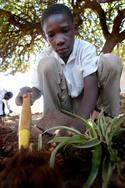Practical Solutions

Right here in Cape Town, groups of ‘knowledge generating’ people are coming together to share ideas and find practical solutions to often intractable problems facing us in the modern world.
We’re seeing it in many different groups who are agitating for us to rethink the food system – citizens, certain farmers, academics, religious groups and civic organisations. The better understanding we have of the food system, the more each one of us can understand where we have the greatest opportunity to influence change.
At a city level, citizens have the power to bring about change, both through how we spend our money, and lobbying retailers and government.
By choosing food that is grown locally, in ways that are ethical towards labourers, animals and the environment, or animal products from pasture-reared and free range animals, we can nudge retailers towards stocking more of those sorts of foods.
If retailers need to source such foods, farmers will begin to farm it in this way. Consumer spending power at the lower end of the value chain can force change all the way back up the system.
We can ask retailers to label locally farmed foods, such as that coming from the Philippi Horticultural Area, so that consumers can choose this food over produce that has been shipped in from further afield. The more consumers buy from these local suppliers, the more it will stimulate the local farmers and surrounding economy.
We can call for local and provincial government to see the value of productive agricultural spaces within the city limits, and to integrate their protection into the city’s development policy. Additionally, we can improve the understanding of the benefits of urban agriculture, and through policy, incentivise property owners and developers to incorporate food production into housing developments.